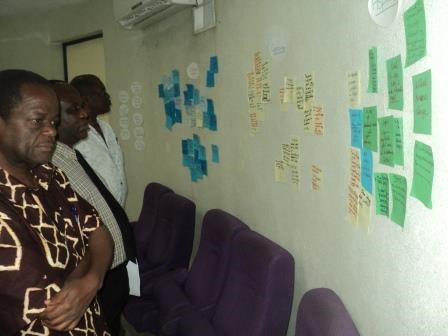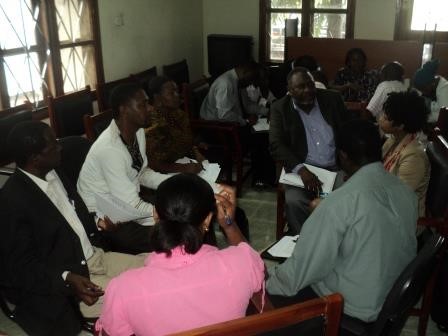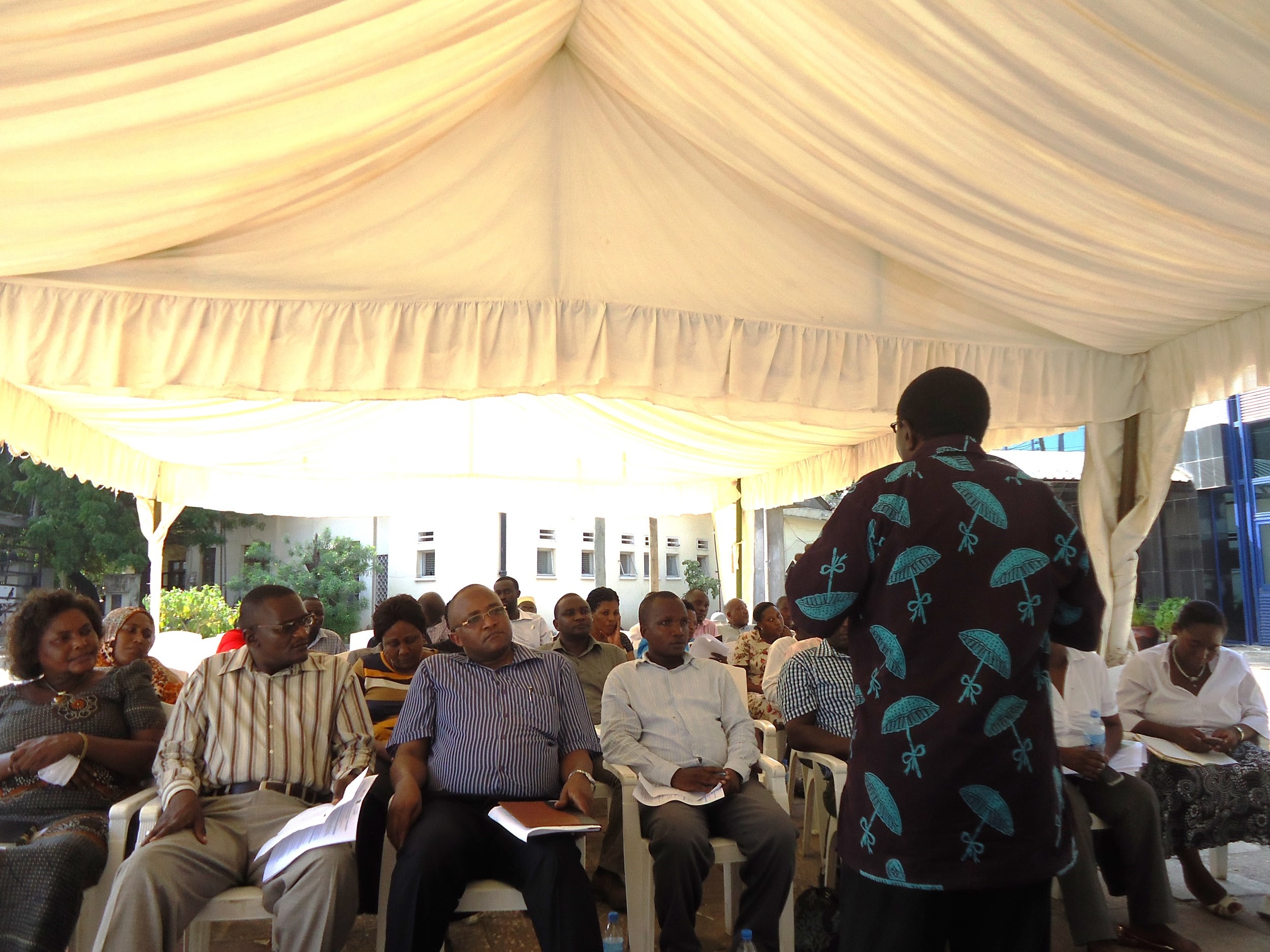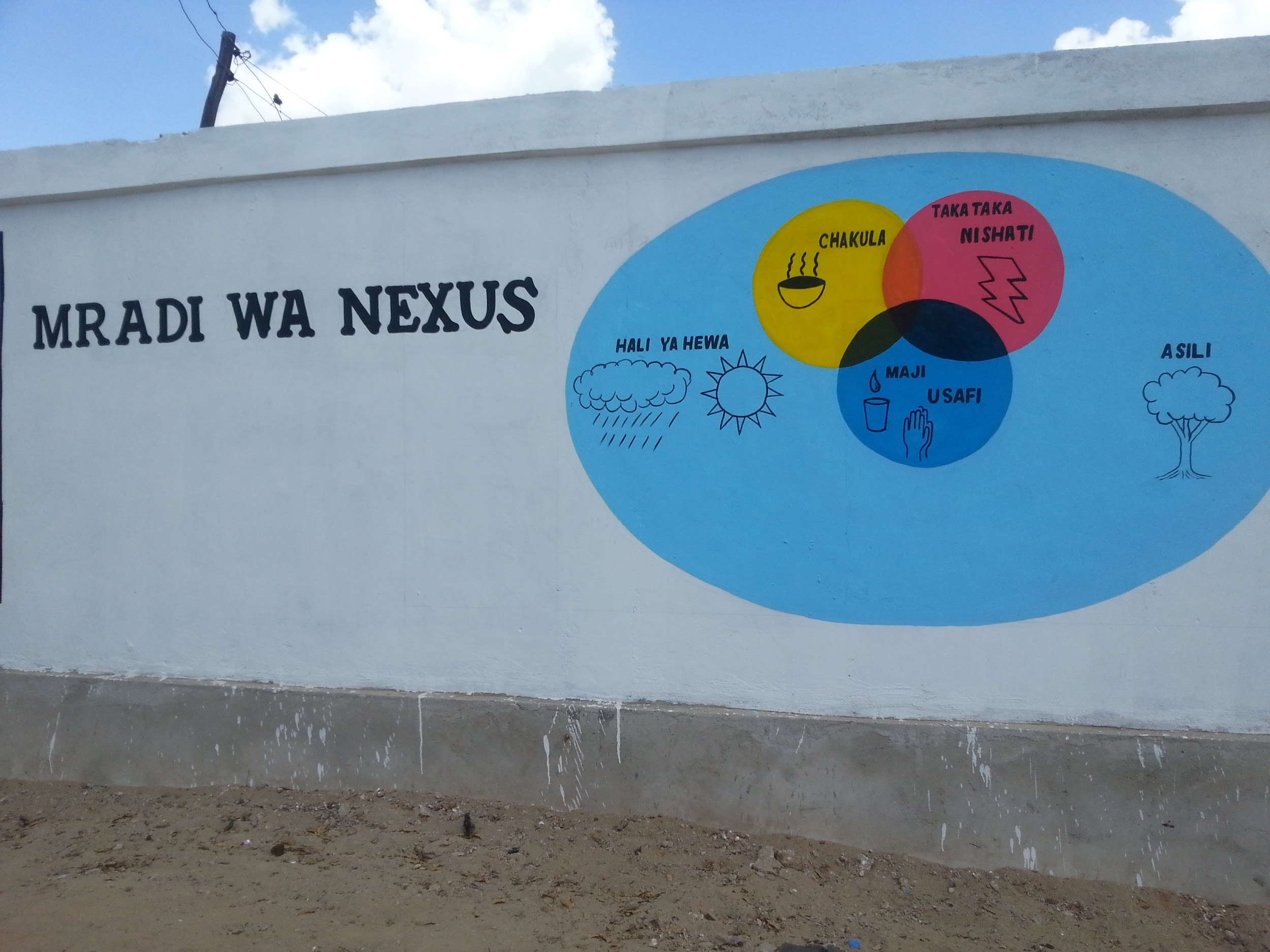By improving food, water and energy use in two impoverished schools, a global network shows integrated solutions don’t have to be complicated
By Kathleen Pierce
Dar es Salaam, Tanzania is a city of contradictions. With more than four million people, it is the largest city in East Africa and a regional hub for business, government, arts and tourism. At the same time, the city is host to vast slums where residents suffer extreme poverty and lack running water, adequate sanitation, electricity and other basic services.

Local stakeholders use Urban NEXUS’s cooperative process to determine which problem to tackle in their community. Photo credit: Sarah Birch
While the city has an established urban infrastructure, its municipal departments can be easily overwhelmed amid competing goals, and projects often become mired in bureaucratic backlogs. Effective collaboration across departments is rare, and making even small changes to improve residents’ daily lives can be frustratingly difficult.
But as one recent collaboration shows, difficult does not mean impossible.
A new approach
ICLEI, an international network of more than 1,000 cities and towns working for urban sustainability, was looking for a place to test a process it had designed to enhance urban residents’ access to quality-of-life services that are often siloed within separate, uncoordinated institutions. As a growing metropolis, Dar es Salaam appeared to be a perfect fit to try out the approach, known as Urban NEXUS, which seeks integrated solutions to maximize resources while minimizing risks, trade-offs and duplication.
ICLEI’s primary partner in the effort was the Kinondoni Municipal Council (KMC), which is one of the five district municipalities in the Dar es Salaam metropolitan region. It coordinates city services in the northern part of Dar es Salaam. The KMC gathered a diverse group of stakeholders to advise on community improvements that included local leaders, religious leaders, professors, school officials, and families. A local NGO, the Environmental Engineering and Pollution Control Organisation (EEPCO) agreed to serve as the on-the-ground partner to implement any solutions that emerged from ICLEI’s process. Although EEPCO was initially wary of working with municipal leaders, it quickly became clear that KMC’s local expertise was invaluable—and that this newfound partnership between the local government and a local NGO would be another positive outcome of the process.
Looking to the community to set priorities
Stakeholders met several times to share ideas, discuss problems, and learn from each other. Although gathering people together may seem like a simple first step toward making improvements in a community facing such dire problems, these collaborative meetings were the first of their kind for a development project in the district.

Local stakeholders discuss goals and opportunities for improving the conditions at impoverished schools. Photo credit: Sarah Birch
Their success surprised even the project organizers. “With community engagement, sustainability and social issues are delicate balance,” said Irina Velasco, project manager at ICLEI’s Africa Secretariat. “There is a fear that there might be a lack of enthusiasm, but it was really an asset. We even had an imam and a Christian counsellor on board, which was unexpected but nonetheless remarkable, especially their willingness to use their platforms for community engagement on development matters.”
Using ICLEI’s process, participants zeroed in on schools as a central focus for making community improvements. Many schools in Dar es Salaam don’t’ have clean water or adequate sanitation, use inefficient cook stoves, and provide students with lunches that are not adequately nutritious. With many families unable to provide much food at home, pediatric malnutrition is a pernicious problem throughout the city.
In addition to educating children, schools in Dar es Salaam serve a number of roles in the community. In bad times, they are used as flood shelters, and in good times, they offer space for soccer games and community education programs. Stakeholders saw that improving schools would not only help the city’s children get a better start, but would also benefit the larger community.
Finding the low-hanging fruit
Two especially impoverished schools were chosen to receive improvements. They happen to be next to each other and share a large open space, a rare feature in their densely populated, low income neighborhood. EEPCO engineers examined the schools’ energy use, drinking water supply and food preparation methods and came up with several recommendations for low-cost improvements.

Kinondoni Municipal Council Official (the late) Mr. Israel Osca Mabiki engaging with stakeholders on food, energy and water issues in the school. Photo credit: Irina Velasco, ICLEI
The solutions the stakeholders ultimately approved may sound remarkably simple, but the project shows that even small improvements can have big impacts. The team planted vertical vegetable gardens to maximize space while providing an additional source of nutritious food for students and teachers, and possibly even allow the school to profit from selling any extra produce. They also purchased energy-efficient cook stoves and installed rain barrels, which collect rainwater for gardening and drinking and help to mitigate flooding caused by frequent heavy downpours.
It all worked because the KMC was already onboard to greenlight these solutions, without requiring collaboration further up the administrative ladder. In Dar es Salaam as in most cities, water, energy, and schools are administered by different municipal departments. Integrated solutions that span these fragmented offices are rare. The project illustrates what can be accomplished, at relatively little cost, when different areas of responsibility can be coordinated.
“Everyone was very committed,” said EEPCO environmental engineer Alfred Shayo. “EEPCO was able to speed up the implementation at affordable costs, but the involvement of the local community created ownership, and ensures sustainability, of the project.”

A school wall erected to minimize crime and raise environmental awareness among schoolchildren and the broader community. Photo credit: Sarah Birch
Project organizers said the integrated solutions developed for this pilot test could easily be scaled up across the city. In fact, the project has already inspired another local school to upgrade its cook stoves.
Beyond its lessons for schools in Dar es Salaam, the project also shows that making small improvements in large cities doesn’t have to be complicated: Engaging local communities and bringing stakeholders together can have a real and lasting impact on the small-scale inefficiencies that affect people’s daily lives.

A mural painted on the wall between the two schoolyards celebrates the local environment and highlights the project’s goals for improving energy efficiency and enhancing students’ access to clean water and nutritious food. Photo credit: Sarah Birch
Kathleen Pierce is a contributing writer for Creative Science Writing and the Thriving Earth Exchange.
